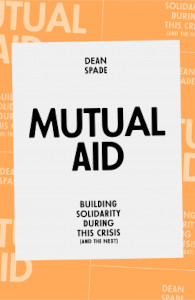
-
Mutual Aid (via) by Dean Spade.
-
Read: May 20th, 2023 – June 6th, 2023
-
Rating: ⭐⭐⭐ (3/5)
This is the first of a couple books I bought from Imagining Radical Futures. I enjoyed it, even though I believe it’s more targeted towards someone already involved in mutual aid work.
Highlights
Mutual aid cultivates the practices and structures that moves us toward our goal: a society organized by collective self-determination, where people get a say in all parts of their lives rather than just facing the coercive non-choice between sinking or swimming; between joining a brutal and exploitive workforce, insurance scheme, or housing market, or risk being left in the cold. — p. 40
The goal of this kind of work [community accountability or transformative justice] is to do the things that the criminal punishment approaches fail to do: give the survivor support to heal, give the harm-doer what they need to stop the behavior, and assess how community norms can change to decrease the likelihood of harm in general, such as by providing healthy relationship skills training, addressing a culture of substance misuse, and changing community ideas about sexuality and gender. — p. 57
Consensus decision-making is based on the idea that everyone should have a say in decisions that affect them. […] We will honor people’s different levels of experience and wisdom as we listen to each other’s ideas, but we will not follow someone just because they act bossy, got here first, or have a higher social status on the dominant culture […] — p. 76
Consensus decision-making happens when everyone in the discussion hashes out possibilities and modifies a proposal until everyone can live with it. Consensus is cooperative rather than adversarial. […] Consensus encourages us to find out what each other’s concerns are and try to create a path forward that addresses all the concerns as well as possible. It is based on the belief that people can cooperate and care about each other’s well-being, rather than the myth that we are naturally competitive and greedy. — p. 77
People can “stand aside” in consensus processes, letting others know that while they are not totally behind this proposal, they agree it is best for the group to go forward with the decision, given all the views that have been expressed and the efforts made to address concerns. — p. 77
To help the meeting be a participatory and supportive space, establish group agreements. The group can agree, for example, that each person will wait for three other people to speak before speaking again (sometimes called “three before me”) […] — p. 93
Social media has encouraged our individualism and has enhanced the desire to “brand” ourselves as radical or as having the “right” politics. […] All of this can motivate us to want to be percieved to be doing things, rather than actually doing them. Much mutual aid work is very ordinary, sometimes boring, and often difficult. — p. 102
When we get our sense of self from fame, status, or approval from a bunch of strangers, we’re in trouble. It is hard to stick to our principles and treat others well when we are seeking praise and attention. — p. 103
If we are to redefine leadership away from individualism, competition, and social climbing, we have to become people who care about ourselves as part of the greater whole. It means moving from materialist self-love, which is often very self-critical (“I will be okay and deserve love when I look right, when others approve of me, when I am famous”) and toward a deep belief that everyone, including ourselves, deserves dignity, belonging, and safety just because we are alive. — p. 103
I need a healing path for myself if I want to be part of healing the world. […] Whatever it is, I have to engage in a gentle way and be careful that it does not become another thing to perfect or to try to be the leader of. — p. 118
The only thing that keeps those in power in that position is the illusion of our powerlessness. A moment of freedom and connection can undo a lifetime of social conditioning and scatter seeds in a thousand directions. — Mutual Aid Disaster Relief (Conclusion)